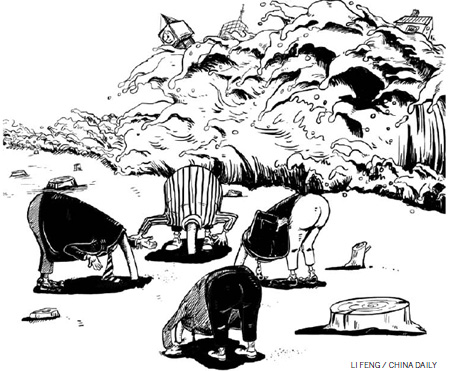-
News >Bizchina
Save energy, save the world
2010-11-23 14:13Editor's note: Negotiations for a global deal to reduce greenhouse gas (GHG) emissions have progressed slowly and the window of opportunity to ward off the disastrous outcome of global warming is closing fast. Urgent and concerted global efforts are needed to stabilize emissions. Vinod Thomas, senior vice-president of the World Bank, tells China Daily reporter Li Jing what countries can do in this regard.
Only a global agreement can prevent emission of excessive GHGs and ensure the market functions properly. But the difficulties of climate negotiations have prevented countries from reaching such an agreement.
Given the situation, governments, especially in developing countries, should start allotting public funds to demonstrate green projects, such as those on energy efficiency and forest protection, to attract private capital and diffuse the technologies on a larger scale. Initial public investments even in small amounts can leverage private funds in demonstration projects on a larger scale and thus multiply social gains.
Improving energy efficiency can reduce GHG emissions greatly. That's why the World Bank Group increased its yearly investment in renewable energy and energy efficiency from $200 million in 2003 to $2 billion in 2008.
But overall, the leveraging has not progressed very far because of, among other things, the political difficulties some governments are facing. Heavy subsidies granted to traditional dirty fuels and other natural resources are a big problem, too.
Current energy subsidies across the world add up to about $5 billion. This makes improving energy efficiency or using renewable energy less attractive. Policies to phase out such subsidies can result in a significantly lower level of GHG emissions.
It is necessary, too, to build monitoring and evaluation processes into the demonstration projects so that the experience can be multiplied. But this process is almost non-existent in many of the current pilot projects because of which technologies and practices cannot be spread.
A pilot project need not only be attractive. It is also important for governments to have a strong political will to move beyond demonstrations, because the market may not always respond with the same passion.
Phasing out energy subsidies is crucial for greater social benefits. In some countries, such as the United States, gas prices are low, and the political difficulties of raising them are well known.
It is true that the suffering of poor people will increase if energy prices are raised, strengthening opposition of groups and creating political risks. One way of ensuring that the poor do not suffer more because of a rise in fuel prices is to provide a "safety net" for them by giving them subsidies directly. That would also ensure that the rich do not go on paying less for the energy they consume. Besides, studies have shown that giving the poor access to energy and electricity does not increase GHG emissions perceptibly and damage the environment much.
Making people understand the impact of inefficient energy consumption on climate is a good way of breaking down the political opposition against removing subsidies. It is necessary for the public to understand the connection between inefficient energy subsidies and natural disasters caused by global warming, which also hurts people's welfare.

Water-related disasters such as floods have increased over the past five years, which according to meteorologists and climate scientists is linked to rising global temperatures. So, to broaden the understanding of the benefits of withdrawing subsidies, it is important to look at the harm they cause and to place the facts before the private sector for its consideration.
Some countries have presented good examples, thanks to their governments' strong political will to increase energy efficiency. For instance, energy service companies have prospered in China because of the initial capital and policy support from World Bank. These companies can provide finance and technical know-how to help industries cut down their energy consumption. Unknown to China earlier, public investment has helped it to test and popularize the idea.
China dominated the world's clean energy market last year, and is poised for further growth. That precisely is why the world is looking at China to take steps that can really change the game. What the world needs now are major shifts, not marginal changes.
It has been a long tradition in big countries like China to experiment a program at the provincial level before multiplying it on the basis of demonstrations. Public-private partnership is essential for deciding the portfolio of technologies and policy tools to reduce GHG emissions, because the blending can better balance the calculus between social benefits and private returns and thus help reduce risks.
But policymakers have to adopt a high degree of flexibility, too, because rigidity can only increase the risks.





